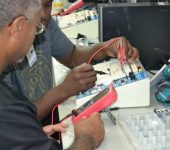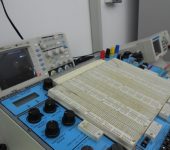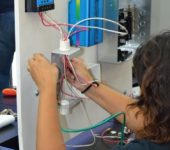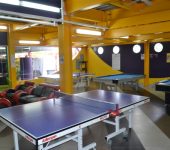Course Brief
Unit Abstract
The responsibilities of the engineer go far beyond completing the task in hand. Reflecting on their role in a wider ethical, environmental and sustainability context starts the process of becoming a professional engineer – a vial requirement for career progression.
Engineers seldom work in isolation and most tasks they undertake require a range of expertise, designing, developing, manufacturing, constructing, operating and maintaining the physical infrastructure and content of our world. The bringing together of these skills, expertise and experience is often managed through the creation of a project.
This unit introduces students to the techniques and best practices required to successfully create and manage an engineering project designed to identify a solution to an engineering need. While carrying out this project students will consider the role and function of engineering in our society, the professional duties and responsibilities expected of engineers together with the behaviours that accompany their actions.
Among the topics covered in this unit are: roles, responsibilities and behaviours of a professional engineer, planning a project, project management stages, devising solutions, theories and calculations, management using a Gantt chart, evaluation techniques, communication skills, and the creation and presentation of a project
report.
On successful completion of this unit students will be able to conceive, plan, develop and execute a successful engineering project, and produce and present a project report outlining and reflecting on the outcomes of each of the project processes and stages. As a result, they will develop skills such as critical thinking, analysis, reasoning, interpretation, decision-making, information literacy, and information and communication technology, and skills in professional and confident
self-presentation.
This unit is assessed by a Pearson-set assignment. The project brief will be set by the centre, based on a theme provided by Pearson (this will change annually). The theme and chosen project within the theme will enable students to explore and examine a relevant and current topical aspect of professional engineering. Students will undertake this project individually.
- This course is offered in 45 hours.
-
BTEC Higher National Diploma (HND) in Engineering (Electrical and Electronic Engineering)
The Pearson BTEC Higher National Diploma (HND) in Engineering (Electrical and Electronic Engineering) will develop students into highly trained, competent professionals, who are able to meet the demands of employers in the various engineering sectors.
This qualification also serves as the next step for students completing the SBCS Diploma in Electrical and Mechanical Engineering Technology programme and are interested in pursuing the BEng (Hons) in Electrical and Electronic Engineering (Technology).
Why choose the HND in Engineering (Electrical and Electronic Engineering)?
- Recognition: This is an Internationally recognized qualification, recognized in more than 70 countries worldwide.
- Final Year Entry: Graduates of this programme gain direct access to the final year of the University of Greenwich's B.Eng. in Electrical and Electronic Engineering (Technology) programme offered at SBCS, Champs Fleurs campus.
- Career-focused: The curriculum was developed to meet the needs of the current marketplace after consultation with employers, students, and professional bodies.
- Practical hands-on training: Emphasis is placed on practical training and the application of the knowledge taught.
Why study Electrical and Electronic Engineering at SBCS?
- Instructors are certified, highly skilled and experienced practitioners who bring their knowledge and work experience to the classroom.
- Modern, fully equipped labs. You learn using the same equipment you will encounter in the field.
- Convenient class schedules. Work, Earn and Study at the same time. Classes are offered on a part-time basis, which allows working individuals to balance their work and educational needs.
Electrical and Electronic Engineering promo video

Our Labs




Our Campus




Schedule & Fees
The next intake for this offering will be in January 2026.
For more details on fees and courses Download the Programme Brief
FEE AMOUNT NOTE SBCS Registration Fee TT$850 each semester
Payable upon registration every semester (for 6 semesters) Tuition Fee TT$2,200 (per 15 credit module) (Cash Price)
TT$4,400 (per 30 credit module) (Cash Price) OR
TT$2,400 (per 15 credit module) (Credit Price)
TT$4,800 (per 30 credit module) (Credit Price)
Total Tuition Fee over 2 years: TT$35,200 (Cash Price) OR TT$38,400 (Credit Price)
BTEC Registration and Annual Fees £600
Payable by: February 2026
Please note: All information provided is subject to change without prior notice.
What's Next?